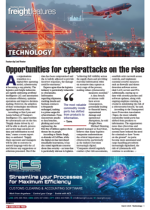Artificial intelligence (AI) and machine learning (ML) algorithms are currently the most inf luential innovations in the logistics and freight sectors, according to Michael Henning, general manager at EasyClear.“The move by the South African Revenue Service (Sars) towards a more standardised and enhanced dataset of invoice and worksheet details on the CUSDEC (Customs Declaration) system, as well as the validation of data such as the VAT number, is a prime example of this shift,” he said. “This will enable artificial processes to better assess risk predictions, improve revenue collection and ensure the accuracy of VAT201 declarations for trade.”Another emerging trend has been the widespread adoption of the Internet of Things (IoT), particularly in the road freight sector. “Transporters are increasingly recognising and implementing digital solutions to enhance efficiency and reduce costs. By analysing live data from f leets and other assets, IoT technology ensures the integrity of goods during transit and delivery, ultimately ensuring client expectations are met.”He added that the application of big data analytics was enabling data-driven decisions related to shipments, customer preferences and inventory management. “EasyClear’s S.a.a.S platform, for example, provides freight and logistics companies with improved visibility across the supply chain by centralising data and offering real-time access to stakeholders,” he said.One notable feature is the Purchase Order Management solution, which can provide visibility in transit into stock ordered and its estimated time of arrival. “This improves the ability to manage warehouse stock more effectively, ensuring greater visibility and streamlined operations. By fostering collaboration and communication between logistics partners, the platform ensures smoother coordination and faster decision-making processes.”According to Henning, AI, ML and cloud-based solutions are driving the most significant changes in the logistics sector. “The more visibility we have on shipments and the greater the volume of data we can collect and analyse, the more proactive and predictive we can be. This enables data-driven decisions that account for various variables, allowing businesses to forecast more accurately, coordinate effectively and make faster decisions that ultimately save both time and money.”He said cloud-based computing continued to play a pivotal role in modern freight and logistics management, providing a highly scalable solution with a wide range of resources, including storage, processing power, networking and on-demand access. “Of course, there are still challenges, with one of the main obstacles being the recognition of the need for technology and the active implementation of digital solutions. This is partly due to the cost, both in terms of time and money, associated with adopting such solutions. However, with AI increasingly integrated into solutions to enhance supply chain efficiencies, delaying digital investment is no longer an option,” he says. “Partnering with a software service provider that understands and optimises the implementation of digital solutions, delivering real-world benefits tailored to specific business challenges, is essential.” LV

